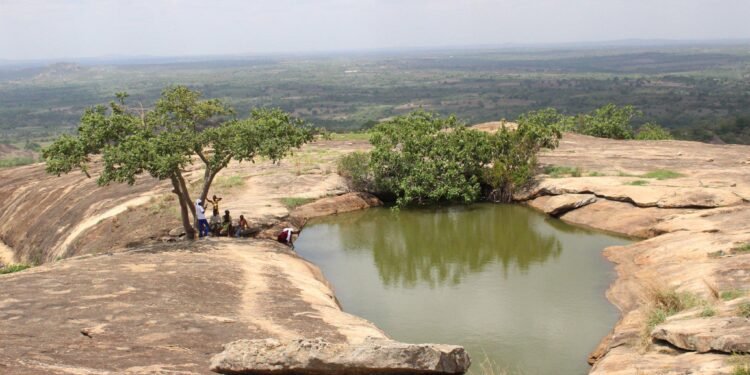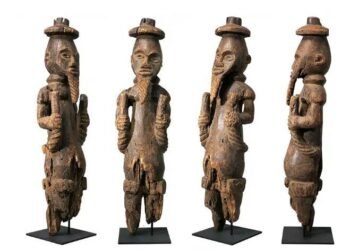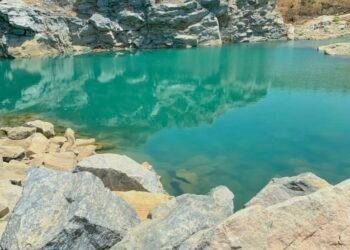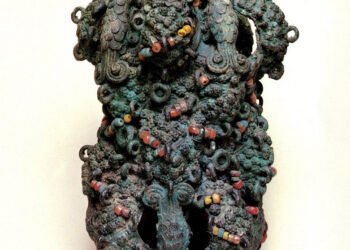Iyake Lake: Nigeria’s Breathtaking Hidden Natural Wonder
High in Oyo State, Nigeria’s hilly terrain, Ado-Awaye Mountain boasts one of the world’s strangest wonders: Iyake Lake. Suspended in its body of water, defying the regular geography, the lake is perpetually on a mountain ridge as part of only two of its kind in the whole world. Its actual power, however, lies in its history.
Its origin is in a woman in mourning whose spirit is said to haunt the lake; it is sacred and taboo, a place where myth and geography meet.
It is to make a profound journey, walking along ancient paths to a secret that has fascinated and commanded respect from all who view its quiet, black waters.
Table of Contents
The Climb Up the Hill
Your journey to Iyake Lake begins with a climb up Oke Ado Mountain. The path is a popular red dirt and rock trail, indicated by exactly 365 steps, one for each day in a year.
This is not just a walk; it’s a gentle walk that demands your attention.
You feel each step, the hum of insects, the shadow of ancient trees, and the weight of the stories infused in this earth. You are walking along paths others have walked before you, part of a living tradition. A local guide tends to go ahead of visitors, pointing out significant landmarks not on any map.
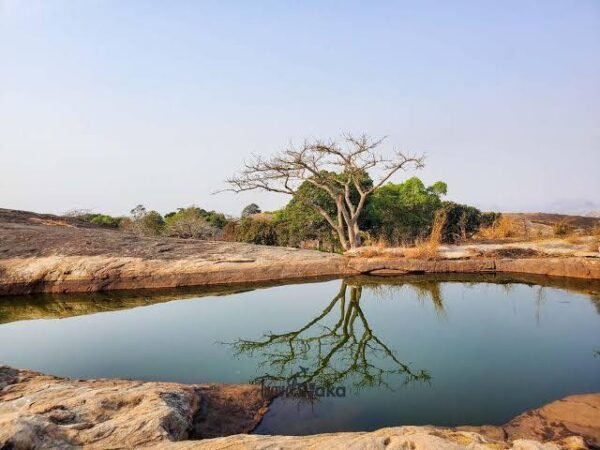
Read Also: The Owu Wall: Ancient Fortress of Nigeria’s Yoruba Kingdom
They take you to the Ishage Rock, a gigantic solitary boulder standing like a witness, and the Esè Àwon Àgbà; unusual, footprint-shaped impressions in the rock face that are revered as the physical footprint marks of the spirits of their ancestors.
This ascent is a physical and mental conditioning, setting the tone for the sacred encounter that awaits us at the summit.
The View from the Top
The final step onto the mountain’s summit is a moment of pure revelation. The world falls away, and the sight immediately captures your attention before you.
Iyake Lake rests there, a stunningly still and perfect oval of dark green water. It does not look entirely real. Imagine a lake perched atop a mountain ridge, not in a valley, but up high, contravening what the natural landscape would usually permit. It is an unusual geological form, to say the least.
The landscape invests a unique blend of tranquility and heaviness, as though the lake is floating between land and sky itself. The quietness, almost the sense of age and solitude, pervades the air. The flawless glass-like surface of the lake is as peaceful as a mirror, showing the trees and clouds surrounding it in near flawless detail.
The body of water seems suspended, presenting an eye-catching demonstration of how tranquil and lovely nature is. At first glance, you are aware of its power. It feels ancient, quiet, and deeply separate from the world you just climbed from. This is the heart of the mountain’s mystery.
The Legend of the Weeping Woman
To truly understand Iyake Lake, you need to know the legend behind its name. “Iyake” in Yoruba means “weeping woman,” and it’s not just a nice nickname; it’s actually an old, settled name in a creation myth.
The myth gets underway this way: one afternoon, there was a much-respected woman in the village, a woman of standing and reputation. But despite standing so well regarded, she had a heavy sorrow: she was unable to have children.
Read Also: The Great wall of Benin: Nigeria’s Forgotten Ancient Marvel
This deep sorrow eventually drove her to the mountain’s lonely peak. It’s said that there, she stepped into the still waters. Her spirit is said to have merged forever with the lake, her own sorrow changing its very character.
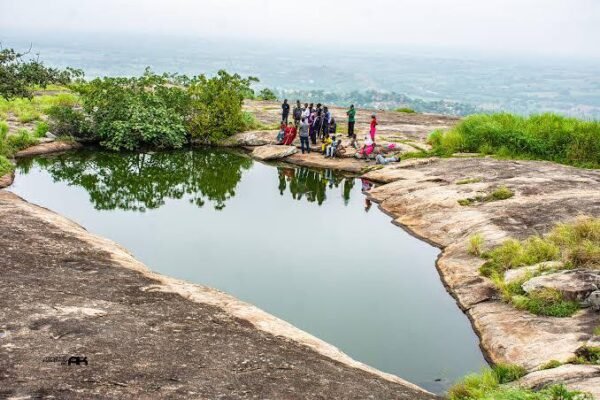
This origin story is not treated as a simple folktale but as a sacred history. It forms the prime reason the lake is not addressed with reckless curiosity, but with a subdued and genuine respect passed down through generations without count.
A Strict and Sacred Rule
There’s one rule to remember each time you go there: don’t go in the water. It’s not a matter of debate. The lake appears calm and quiet, but don’t even consider swimming.
It is not a laughing order but a seriously followed prohibition upheld by the entire community.
It is founded on the deep belief that the lake returns nothing it has received. This is not seen as a superstition, but as an actual warning born from centuries of tradition.
The prohibition is an act of respect for the weeping woman spirit Iyake, whose essence is contained within the water. It is also a practical acknowledgment of the unknown and potentially bottomless lake depth.
To be so short-sighted as to ignore this rule is to show blatant disrespect, not just to local custom, but to the very nature of the place itself. The water is to be looked at, not handled.
The Hole Called Agbómofúnyàke
At the water’s edge is a little, water-filled pit. It is called Agbómofúnyàke, and its name is a weighty one, one that refers directly to the lake’s dark legend.
The name means a phrase that translates to “brings the child home to the mother.” This is not a reassuring nickname. It is instead a raw and sobering threat. The hole is a physical reminder of the powerful and dangerous nature of the lake.
Read Also: Explore the Beauty and Culture of Igbara Oke
Its existence itself is a standing invitation to recall that this is a region of deep spiritual power, where curiosity needs to be balanced with respect and humility. It calls out for reverence rather than exploration.
An Official Ecological Sanctuary
Apart from its intriguing mythology, Iyake Lake is also ecologically essential. Mountain wetlands such as this one are beneficial to water management in the form of natural reservoirs: they absorb seasonally precipitating rain and sustain permanent groundwater recharge, the foundation of local water security.
The habitat is a biodiversity hotspot, safeguarding rare and endangered species that are becoming increasingly imperiled elsewhere.
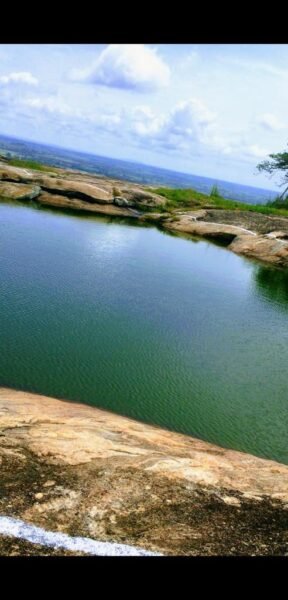
Having a Ramsar designation also entails protection of not just the physical environment, but of the cultural and historical value of the site; a value that cannot be separated from the environment itself.
In functional terms, such protection ensures that the lake remains sustainable in the long term, protecting continued ecological health and benefit to the population living there. Overall, the site offers considerably more than just aesthetic interest; it’s an environmental resilience and cultural continuity resource.
The Community’s Enduring Duty
For the people of Ado-Awaye, Iyake Lake represents a profound spiritual duty. They are its loyal guardians, a job passed from generation to generation. What’s important is sustaining a sacred trust, not just about maintenance. Crucial components of this preserve are the tales they tell and the lessons they teach.
Read Also: Ogbunike Caves: A Hidden Natural Wonder in Anambra
When you visit, you are their guest. Their guidance is offered to ensure your safety and to preserve the sanctity of the mountain, asking that you approach with the same respect they show.
Balancing Preservation and Progress
Iyake Lake stands at a crossroads, its future shaped by thoughtful choices. Its raw authenticity, free from overwhelming commercial development, is its greatest asset.
Yet this lack of infrastructure presents a clear challenge. The future potential is an observant, community-controlled approach. The goal is to create sustainable tourism that brings returns to the local people without sacrificing the site’s holy integrity.
This excellent balance is essential. Success means protecting the lake’s powerful spirit and ensuring its profound story can be shared respectfully with generations to come.
Preparation for Your Visit
A trip to Iyake Lake requires careful preparation. Plan your hike during the dry season to prepare for a more accessible and safer climb. Wear hardy shoes on the rocky trail and never forget to pack water.
Gather funds for the entry fee and for employing a local guide; their work will be worth it. And finally, the most excellent present that you can take is an open and respectful heart. You are a participant and not just a spectator, after all.
